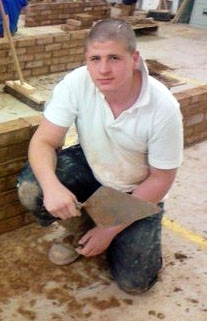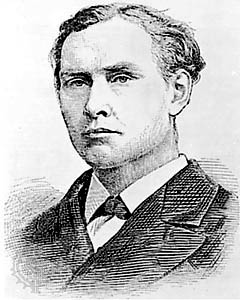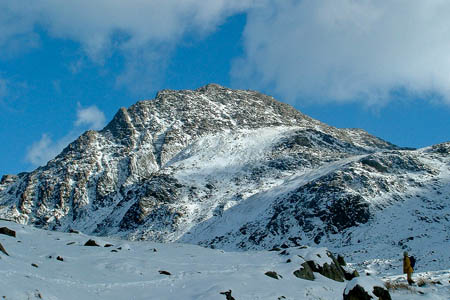A man who nearly died in a fall on one of Snowdonia’s peaks has backed a campaign to improve safety on the mountains.
Ben Halley spent two days on a life-support machine at the Ysbyty Gwynedd in Bangor after a six-hour operation by mountain rescuers to get him down from Tryfan after he fell 25m (80ft). Bad weather prevented an RAF helicopter reaching the 18-year-old, 840m (2,750ft) up on the north ridge.
Now, Ben has added his voice to the MountainSafe campaign, which aims to cut the number of mountain rescue callouts. The number of rescue calls has doubled this year, both nationally and in Snowdonia.
The campaign is backed by North Wales Police, Snowdonia National Park Authority, North Wales Mountain Rescue Association, Plas y Brenin, the British Mountaineering Council and Mountain Leader Training Wales.
The 18-year-old, an experienced mountaineer, recalled his ordeal while scrambling on the 915m (3,002ft) peak in the Ogwen Valley 20 months ago. Despite being well equipped and part of a skilled group of scramblers, the Bromsgrove man, 16 at the time, still ended up with a broken skull, bruised kidneys, a lacerated liver, ruptured spleen, four broken ribs and a punctured lung. It was only the care of the Ogwen Valley Mountain Rescue Organisation members, RAF helicopter crew who flew him from the lower reaches of the mountain, and staff at the Ysbyty Gwynedd that saved the young outdoor enthusiast’s life.

Ben Halley: 'Frightened that I would die'
He said: “I had been up Tryfan at least five times before and I knew it well. I was with my uncle and two of his friends. We were all quite experienced and had the right equipment. I was leading on a scramble, I don’t know exactly what happened, but I think I may have been hit on the head by a falling rock, which then sent me falling. We were 2,750ft up.
“The people I was with saw me flying past them. I think I fell about 30ft, landed on a ridge, then fell a further 40 to 50ft. Where I landed, about six feet to the left there was a 1,000ft drop. The rescuers thought I might not make it; I would definitely have been dead if I’d landed six foot to the left.
“I wish to say a personal thank you to the people who rescued me. I have no doubt that they saved my life. I will be on medication for the rest of my life, but I’m alive. There was a point at the hospital, just before I went into theatre, where I felt I should say goodbye to my family, I was frightened that I would die.”
But within a little more than three weeks after his fall, Ben was well enough to post a comment on grough detailing his horrific injuries.
Tim Bird, a North Wales Police representative on MountainSafe, who is also a member of the OVMRO, was part of the team that brought Ben safely off the mountain in an operation that saw him being lowered on a stretcher for six hours to a place where the RAF Sea King could land.
He said: “This was a serious incident. It was very windy and the helicopter couldn’t lift him off until the team could get Ben much further down the mountain. He was seriously injured, Ben and his family are very aware that he is only alive because of the efforts of the mountain rescue team, the RAF and staff at Ysbyty Gwynedd, Bangor.”
The workload of mountain rescue teams has doubled, and analysis of incidents indicates that, unlike Ben’s party, people are going ill equipped; incidents of slips and falls are up and people are setting out too late.
Although the number of incidents has increased, the number of fatalities has stayed about the same but this does not include the December figures, which include a fatality on Snowdon last week.
Up to the end of November, Llanberis Mountain Rescue Team had attended 170 incidents, Ogwen Valley 120 and Aberglaslyn 33.
Tim Bird continued: “We want people to continue to come and enjoy the beautiful mountains of north Wales, but before they set out they need to ask themselves are they properly clothed and equipped; do they know the weather forecast; have they got the mountain skills needed for the terrain they’re about to tackle?
“This year we have seen more and more incidents of people being hurt, people getting lost, groups starting out late in the day with one torch between them, people getting caught out by the weather and inexperienced walkers without the proper equipment or clothing.”
Further support came from heritage minister Alun Ffred Jones, who said: “We are blessed in Wales with areas of outstanding natural beauty and using our natural outdoors as a green gym is a really good way of keeping fit, but I can’t emphasise enough how important it is to be fully prepared for all weather conditions in the mountains, especially during the winter.

Conditions on the mountain tops can change suddenly and visbility drop to virtually nil
“Weather conditions can change from hour to hour and can make a day out enjoyable and memorable or potentially dangerous. I would urge all visitors to the mountains over the Christmas period to make sure they allow plenty of time when planning a route and to also ensure they are fully prepared for the conditions.
“That is why the Welsh Assembly Government, working in partnership with the Meteorological Office, supports the Mountain Weather Wales service, which provides daily forecasts of the weather conditions in both Snowdonia and the Brecon Beacons.”
Also supporting the campaign is Group Captain Jonathan Dixon, RAF Search and Rescue Force commander. He said: “The RAF SAR Force fully supports the activities promoting mountain safety, and we will continue to provide our services when requested to save lives in north Wales.
“We will also continue to work closely with all the emergency services and look forward to strengthening that relationship through the North Wales Police MountainSafe initiative.”
MountainSafe advice is:
- Plan your walk properly. Make sure that you tell someone where you are going and what time you expect to be back
- Make sure that you have the proper equipment and know how to use it
- Be prepared to turn back if the weather gets worse
- Seek advice from experienced mountaineers and take advantage of weather forecasts
- If you are an inexperienced walker or just want to make the best use of your time then consider using a qualified mountain guide or instructor or attend a training course
- Do not underestimate the mountains of Snowdonia and overestimate your own abilities.
Futhermore, experts say:
- Experience is no guarantee against failure. A high proportion of casualties considered themselves experienced mountain goers
- Hill walking is high risk. Most accidents happen to hill walkers not climbers
- Slip at your peril. Most accidents are caused by a slip or trip which can result in a long fall
- Preparation is paramount. There are few incidents which result from equipment failure or misuse
- Mountains are merciless. The highest percentage of casualties are from the South of England
- Give mountain rescue teams a break: don’t get lost. A commonly cited contributory cause of mountain incidents is poor navigation
- Plan properly. Over one third of all incidents result from poor planning which often results in the underestimation of time and the severity of terrain
- Enjoy the mountains safely and remember: getting to the top is optional but getting back down is mandatory.

Edward Whymper: "From the beginning think what may be the end"
And finally, one maxim to remember when on the hills and mountains of Britain is that of late Victorian climber Edward Whymper: “Climb if you will, but remember that courage and strength are nought without prudence, and that a momentary negligence may destroy the happiness of a lifetime.
“Do nothing in haste; look well to each step; and from the beginning think what may be the end.”
Comprehensive weather forecasts and Scottish avalanche reports are available via our links at the top of this page.
Mountaineering Council of Scotland mountain safety adviser Heather Morning is also running a series of avalanche awareness courses at discounted prices.
grough also has its own guide to winter mountain safety, with lots of handy hints on making your days on our hills more enjoyable and that bit safer, as Britain experiences further arctic conditions in the run-up to Christmas.

![[CC-2.0]](/lib/img/layout/cc-attr.gif)